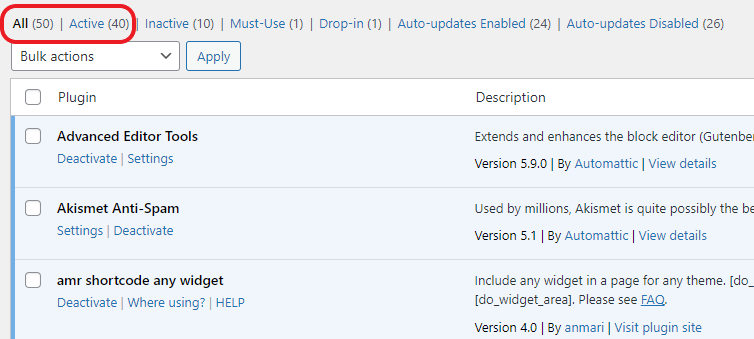SEOs collect expenses the way beards collect food. But, unlike one’s scouring pad, few SEO people undergo routine cleansing. That’s fine, but what about when their clients also have a similar tendency to pick up more and more expenses? One or both of you will waste a lot of money, waste at least a little time, and maybe miss opportunities to simplify and refine your process and get closer to your visibility target. Sometimes you need to thin the herd.
Often, people don’t need as much stuff as they think they do. That’s true in local SEO and in many other areas of online marketing. I’m an odd bird in many ways, including in my philosophy that you should be able to do your work with very few third-party tools. That doesn’t mean you shouldn’t use any, or that you eschew them when they’re available to you, or that you shouldn’t know how to use them masterfully. I just mean it’s wise to reduce your dependence, so that you’re not one busted tool, expired credit card, or belly-up company away from getting lost in the Deliverance-like wilderness that is Google.
My advice is simple: pack less. See what you can take out of the rucksack. If you get rid of items you don’t need, you’ll have more money and capacity for things you do need or really want. More of your money can go toward:
- Savings
- Developers & development
- Writers & writing
- Professional photography
- Link opportunities that require payment
- Increased ad budget in tried-and-true PPC campaigns
- Getting a small amount of professional SEO help on an as-needed basis, rather than lugging 100% of it yourself
If you’re an SEO, you may be bad at packing light, but you can probably help your client do it. If you’re the business owner / client, you and your SEO person should do an inventory of what tools, subscriptions, and similar online-marketing-related expenses YOU alone – or both of you – are paying for. The same is true if you’re a business owner who does your own SEO.
There is zero downside to a quick inventory. On the off-chance that you find nothing you should trim or change from jumbo to regular, then you’ll get the rare satisfaction of knowing you’ve put all your money to good use. But more likely is that 1-3 items will jump out at you as waste. With a little scrutiny you’ll find those and maybe even a couple more expenses that only weigh you down.
This post is meant to help you with the scrutiny part. What should you cut, and why? I can tell you what’s usually a waste, and you can decide what to chop.
Here are the basic categories of expenses I ask clients about, inventory with them, and often suggest dropping:
1. Rank-trackers. Some are good, but some are paperweights. Generally, if a rank-tracker is not specifically designed to show you Google Maps rankings in addition to organic rankings, it’s not a big help or even an accurate gauge of how visible your business is. Likewise if it only lets you track “keyword + city” and doesn’t let you track your rankings for “keyword” in this or that city or other location as the default search location.
2. SEO tool suites. At best, these tend to have 1 tool you use all the time and 3 that you like about as much as a cat likes vegetables. Often you can get some version of your favorite Friskies flavor a la carte and chow down.
3. Listings-management services, like Yext. It’s one thing if you’re AutoZone and have 6000 locations for which you need to build, correct, and occasionally update some local citations. Yext or other programmatic listings-management tools do come in handy in those situations. But otherwise, if you’ve got one location or some number fewer than “How many locations do we have, anyway?” then I suggest doing the manual citation work in-house or through an outfit like Whitespark. It’s a slog or a chunky one-time expense, but at least you’re not paying to rent your listings month in and month out.
4. Link-analysis tools. I love Ahrefs, and use it constantly. Some people dig Majestic. Never cared much for Moz’s Open Site Explorer. When clients of mine say that they use a link-sniffer, I tell them they should probably continue if they use it all the time and have made it a healthy habit. But if they don’t, I tell them only one of us needs to pay for it to monitor their links and their competitors’ links, and that I’ve got their six-o’-clock.
5. ORM software or services. With a few exceptions that can work beautifully (in the right hands), you’re delegating your online reputation to a piece of software or to people who know little about your business and even less about your customers. You’re hoping they easily solve a problem you’re not even willing to work on: getting more good reviews and fewer bad reviews. As I’ve written, these can be useful after you personally figure out what works for your business, but not before. In the meantime, don’t pay to automate a process that you don’t know is effective.
6. Plugins. If your site is on WordPress, more plugins usually mean slower page-loading, more opportunities for plugins to conflict with each other and fail, and more vulnerabilities to hacking. Many of them are just for cosmetics, or add only a little extra convenience, or can be replaced by a good developer who can hand-code the same functionality.

7. Link-building services. Most of these supposedly “turnkey” or “managed” services just build garbage backlinks on garbage sites. Usually the links just don’t help, and the rest of the time they either get you an algorithmic penalty sooner or later, or they help you a little bit early on and then don’t help you at all. My general rule is: if the link is from a site that isn’t relevant to your profession, isn’t relevant to your location, and didn’t take any discernible work to earn, then it probably won’t help your Maps or organic rankings one pinch. Save your money and put it toward a couple of dummy links.
8. Writing services. A good stunt pen – one who can do quick but thorough research and fire a creative neuron or two – is someone you always want on your team. But a “service” staffed by professional regurgitators who carry a whiff of ChatGPT on them will not help you. Either write it yourself, have a lieutenant or swabbie do it, or pay a little extra to have it done by someone who specializes in learning enough about your space to write a coherent page or two on it.
9. Other domains. Buying domains similar to the one you use for your brand(s) is smart. But it’s hard to say the same about holding onto 78 domains that you’ve had years to monetize and haven’t, or that don’t forward to any of your live sites, or that aren’t expired domains with strong backlinks profiles. You probably won’t enjoy folding domains that you paid for for years without seeing a dime from them, but it beats holding them for even longer and pot-committing yourself.
10. Memberships, like the BBB or a local chamber of commerce that doesn’t link to members. There may be good reasons to join those or any given organization. But for years now BBB has given accredited businesses only nofollow links, and some chambers of commerce and industry organizations do that, if they even link to members at all. So IF you have joined or have stuck around only for the link or because you assume there will be a direct benefit to your rankings, you’ll be disappointed
11. “Premium” listings on certain local or industry directories. I’m talking about the kind of deal where you can get listed in a directory for free, and get bells and whistles if you pay to upgrade. If you know for a fact that you get the occasional customer / client / patient who found you on the directory, or if you get a half-respectable link out of the deal, then you may want to keep it around, or if the directory is so visible in Google that just about everyone sees it before reaching your site, then it’s probably a keeper. Otherwise, if a sales rep or an SEO or other marketer gave you murky reasons to pay for it, and if you’ve never seen any benefit, just get rid of the gold and try the tin.

12. Unnecessary cooks in the kitchen. You don’t need two people doing “Google My Business management,” auditing your site, and tinkering with your PPC. If you get outside help at all, then put in the due diligence, pick the person more likely to do a good job, and let that person prove your decision wise or unwise.
Sometimes you’ll take one look at the list of SEO-related expenses and see rolls of blubber jiggling before you. Other times you can’t tell what’s fat and what’s muscle. So even though you know what specific expenses you might cut or might suggest cutting, and know you probably should cut it, the squeaky voice of risk-aversion tells you to leave it alone for now. What is the basis of that FUD, and to what degree should you listen to it? How do you render a judgment? Here are 3 questions to ask about everything you pay for or that your client pays for:
Is it useless? Not necessarily bad, but not helping your local SEO effort in any describable way. If you’ve never based a decision on its data, or it’s never done for you exactly what it was advertised to do, or if it’s never yielded one good lead, you should drop it.
Is it replaceable? Can you create – or have someone else create – a replacement or a stand-in or an internal version that does pretty much the same thing?
Is it redundant? Maybe it’s great, but maybe both the SEO person and the client don’t want or need to own or subscribe to the software (or whatever the expense may be) at the same time.
Effective SEO is about laying down the basics quickly, imperfectly, and over a long period, with one eye on data you get directly from Google and another eye on patterns as to what kinds of leads are coming in. You keep doing the basics until the rubble bounces, and you skip most of the fancy stuff. That is a matter of focusing on processes rather than products. If a tool, service, or other expense has earned its place in a process that works for you, keep it around. If you’re not sure how it helps, and nobody can seem to explain why it helps you, chuck it. You’ll save a little money, a lot of money, and you may simplify your whole SEO approach in such a way that you finally start seeing fruits from the toil.
Is there a piece of flab I forgot to mention?
Are you paying for something you suspect isn’t earning its keep?
What are your criteria for figuring out what stays and what goes? Leave a comment!


Recent Comments